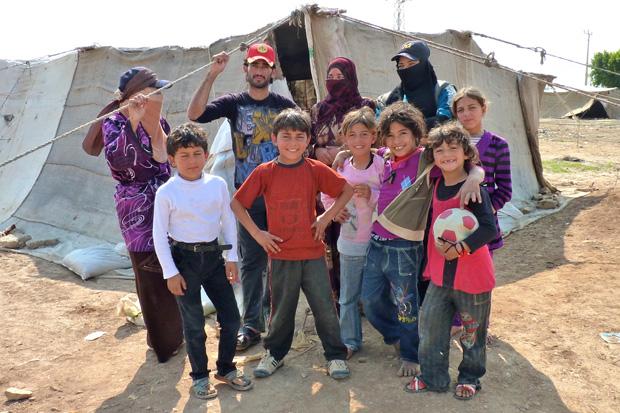Kidnappings reported as Lebanese strain under Syrian refugee load
Some Syrian refugees have found work picking vegetables near Jordan’s border with the West Bank. (Photo by Matthew Bell.)
At least seven Lebanese and Syrian citizens were kidnapped in northern Lebanon near the Syrian border over the weekend — the first reported abductions fueled by tensions over the uprising in Syria that has sent refugees fleeing into its small neighbor.
The tit-for-tat abductions occurred in the Wadi Khaled border region between the two countries, where tensions have run high between supporters and opponents of the regime in Syria. Wadi Khaled is home to many who’ve fled the terror in Syria. Like “Noor,” a 20-year-old woman wearing a colorful headscarf.
She used to study education at a university in Homs — the epicenter of Syrian violence. Now, she and 5,000 other Syrian refugees are here in Wadi Khaled.
She lives in a drafty concrete elementary school with her family and about 50 other people. She and most of the other refugees have been in Lebanon for more than a year because it is too dangerous to go back home. She said anyone who tries to go back dies or disappears.
“They killed my brother,” she said. “He came here from Syria to see our mother and when he tried to go back they killed him. He was shot. The regime also arrested two of my uncles and they disappeared, and now we don’t know anything about them.”
Noor asked that her name be changed so that someday she might return to her hometown, a place called Tel Killa, just a few miles across the border from Lebanon. When the uprising began, many in Tel Killa joined it. Fighters and weapons flowed across the border. It wasn’t long before the Syrian army moved troops into the town and began shelling it. The inhabitants fled.
Another refugee named Sa’er, who didn’t want to give his full name, said the Syrian military has now effectively sealed off the border.
“They planted a lot of landmines along the border,” he said. “A lot of people have had their legs blown off by the landmines. So now no one crosses.”
Now, the only route out of Syria is through the one legal border crossing in the area. But Syrian soldiers and border guards demand bribes from anyone wanting to leave the Tel Killa area legally.
A refugee named Rikat had to pay.
Rikat said she paid a $100 bribe to one of the Syrian Army commanders in Tell Killa to let her and her family flee.
“He didn’t do it out of the kindness of his heart,” she said of the army commander. “If it was up to the Syrian Army’s kindness, then they wouldn’t let us out of the country.”
Syrian refugees and Lebanese who work with them in Wadi Khaled said they have heard the Syrian military can charge up to $1,000 or $2,000 to get out of the Tel Killa area and enter Lebanon through the one the legal border crossing.
Not all the refugees fled to Wadi Khaled. Some, like Ali al-Kurdi, have found refuge along the main coastal highway north of Lebanon’s second largest city, Tripoli. He and his family are better off than most — they can afford a modest apartment with furniture. But they can’t go back to Syria for fear of arrest, detention, army conscription or death. Kurdi’s oldest son is already detained in Syria. His other son can’t return.
“Several of my friends were forced to enter the Army,” Zeid, al-Kurdi’s 19-year-old son, said. “We haven’t heard anything from them since they took them away.”
Zeid said the Syrian government is intentionally conscripting young men from towns that have rebelled. He said he had heard stories of soldiers being forced to fire on their own friends and neighbors.
“You either have to defect or fire at the target you are told to fire at,” he said. “If not, you will be shot in the back.”
His father, Ali al-Kurdi, pulled a book off his bookshelf, and put it on a coffee table next to another book.
“This is the Koran, and this is the Bible,” he said, adding that no one should fear the uprising except for the current regime. He said Sunnis, Christians and Alawites — members of an esoteric Shi’ite branch of Islam — will all prosper in a post-Assad Syria.
President Bashar al-Assad is an Alawite and his regime often paints supporters of the uprising, like Ali al-Kurdi, as al-Qaeda or Sunni Muslim extremists.
“We are a moral revolution,” al-Kurdi said. “This is not revolution of Sunni Muslims against Alawites. We love the Alawites.”
But it is looking harder and harder to contain sectarian hatred. After the recent massacres in Houla and near Homs, more Syrians in and outside the country say they are growing angry with the Alawite militias, the Shabiha, who are allegedly responsible for a list of atrocities. On Thursday, Kofi Annan, the United Nations special envoy to Syria, warned of the possible consequences if the violence is not halted immediately.
He said the country’s future now consisted of “brutal suppression, massacres, sectarian violence and even all-out civil war.”
